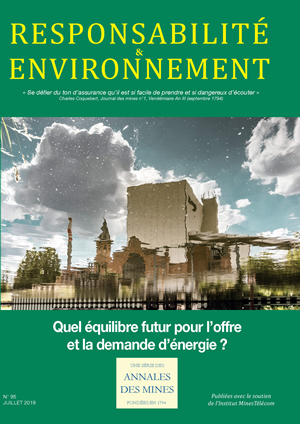|
 N° 95 - Juillet 2019 - Quel équilibre futur pour l'offre et la demande d'énergie ? N° 95 - Juillet 2019 - Quel équilibre futur pour l'offre et la demande d'énergie ?
A carbon-free world – What is Russia’s response?
Par Tatiana MITROVA
PhD, Director, Energy Center, SKOLKOVO Business School
et
Yuriy MELNIKOV
Senior analyst, Energy Centre, Moscow School of Management SKOLKOVO
The article reviews the impact of decarbonization and the global Energy Transition on Russia, analyzing Russia’s position in relation to climate change and decarbonization agenda. Unlike some European countries, Russia has not yet made decarbonization of the energy sector a strategic priority. This is partially explained by the fact that there is a degree of skepticism among the stakeholders in relation to global climate change. Ranking fourth in the world in terms of primary energy consumption and the volume of carbon dioxide emissions, Russia continues to rely on fossil fuels, while its GDP energy intensity remains high amid relatively low energy prices and high capital costs. The share of RES in the energy mic (solar and wind power) is negligible and is not projected to rise above 1% by 2040. However, there is no denying that the Russian energy sector is beginning to feel the impact of increasing global competition, growing technological isolation due to sanctions and ongoing financial difficulties. Quite apart from the impact of global climate change agenda, these factors present Russia with the necessity to produce a new development strategy for its energy sector, which has been and remains crucial for its economy.
 Télécharger gratuitement l'article Télécharger gratuitement l'article
 Retour au sommaire Retour au sommaire
 N° 95 - July 2019 - What future equilibrium for the supply and demand of energy? N° 95 - July 2019 - What future equilibrium for the supply and demand of energy?
A carbon-free world – What is Russia’s response?
Tatiana Mitrova,
PhD, Director, Energy Center, SKOLKOVO Business School,
and
Yuriy Melnikov,
Senior analyst, Energy Centre, Moscow School of Management SKOLKOVO
The article reviews the impact of decarbonization and the global Energy Transition on Russia, analyzing Russia’s position in relation to climate change and decarbonization agenda. Unlike some European countries, Russia has not yet made decarbonization of the energy sector a strategic priority. This is partially explained by the fact that there is a degree of skepticism among the stakeholders in relation to global climate change. Ranking fourth in the world in terms of primary energy consumption and the volume of carbon dioxide emissions, Russia continues to rely on fossil fuels, while its GDP energy intensity remains high amid relatively low energy prices and high capital costs. The share of RES in the energy mic (solar and wind power) is negligible and is not projected to rise above 1% by 2040. However, there is no denying that the Russian energy sector is beginning to feel the impact of increasing global competition, growing technological isolation due to sanctions and ongoing financial difficulties. Quite apart from the impact of global climate change agenda, these factors present Russia with the necessity to produce a new development strategy for its energy sector, which has been and remains crucial for its economy.
 Retour au sommaire Retour au sommaire
|




